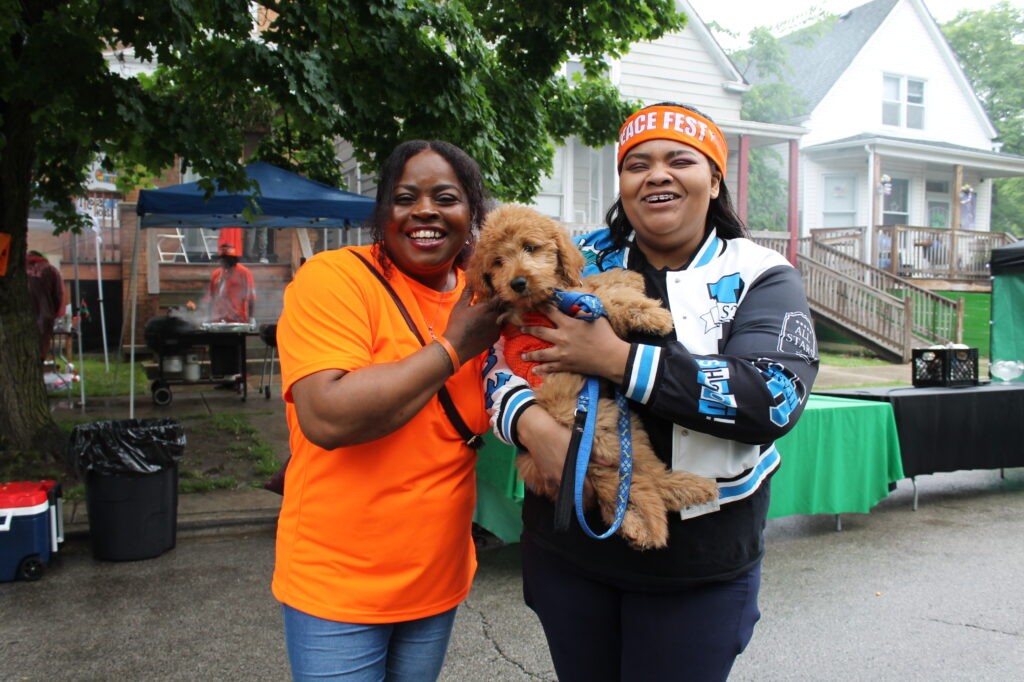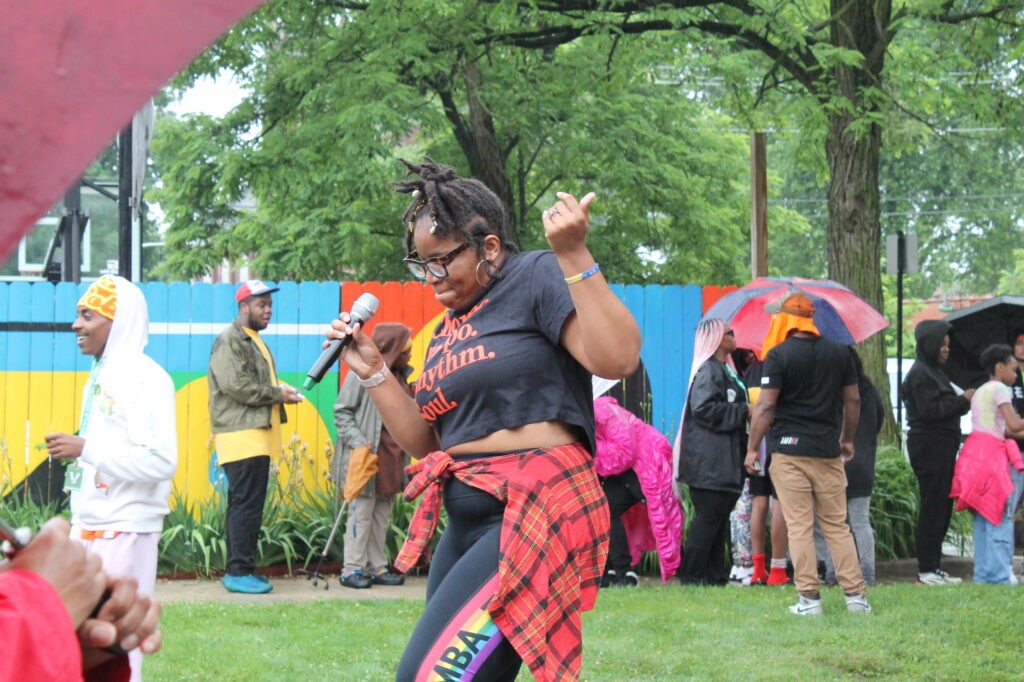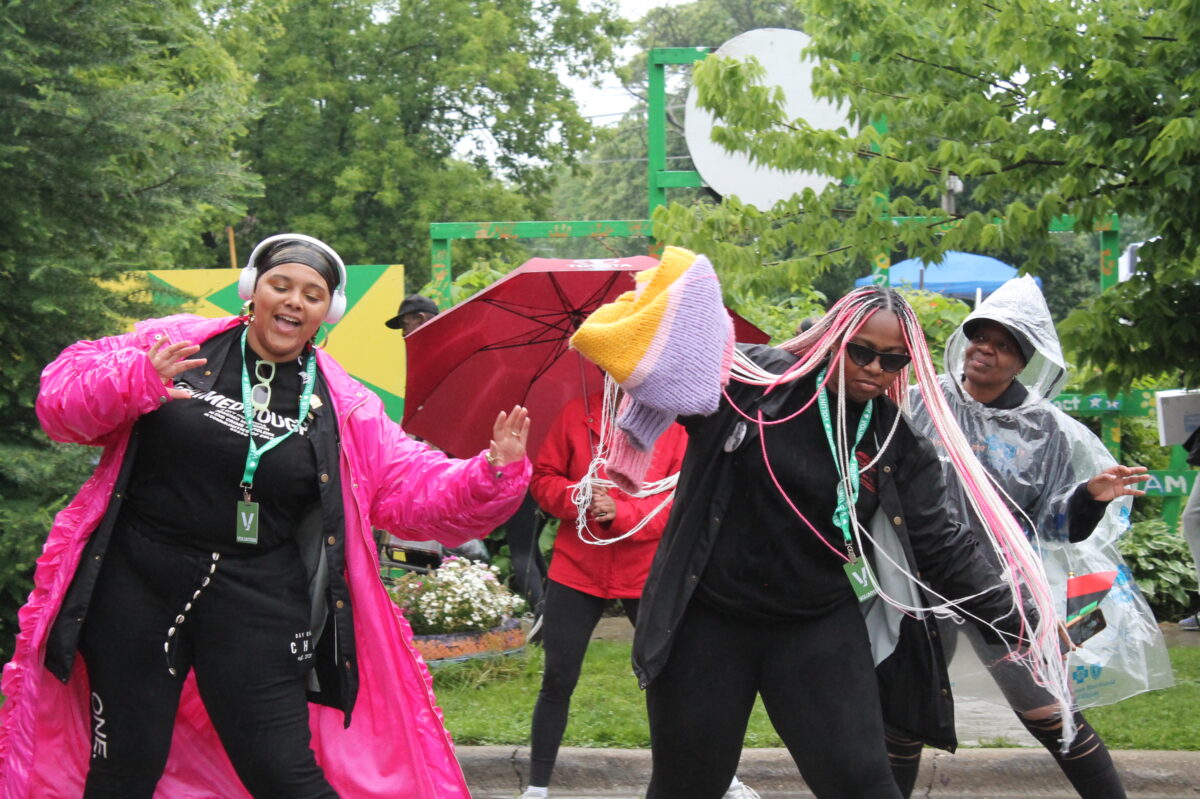On a gray Saturday in June, sounds of laughter, conversation, and music reverberated for blocks in West Englewood. Imagine Englewood if’s Peace Campus at Honore and 64th radiated with joy and playfulness as young people ran through blocked-off streets with ice cream in hand, uncles tended to hot dogs on the grill, and lines of people danced the “Cupid Shuffle.”
The annual Peace Fest brought together children, families, and other community members for a day of play and fellowship despite the incessant rain that started earlier that morning and continued into the evening of June 1. This year’s theme, Black-on-Black Love, turns the overused phrase “Black-on-Black crime” on its head.
“We’re trying to reverse the stereotype about ‘Black-on-Black crime,’” said Michelle Rashad, Imagine Engleweood if’s (IEi) executive director. “We can’t ignore that it still has had great impact on our communities, on all of us, [but Peace Fest is about] being able to come together with those joys to heal some of the trauma that we’ve all experienced.”
IEi, a nonprofit that creates safe and empowering spaces for youth and their families in the Greater Englewood community, started hosting the festival about eight years ago as one of its signature annual events to honor gun violence victims and survivors and their families. This year, the block-party-style festival took place the weekend before Wear Orange Weekend, a national initiative to raise awareness about the impact of gun violence, which originated after the fatal shooting of Hadiya Pendleton on a Chicago playground in 2013.
IEi’s Peace Campus activated its community garden, nature play lot, basketball courts, and main Peace House to accommodate Saturday’s festivities. The family-friendly activities, such as art-making, were supplemented by a wide range of service providers and free food.
Alia Ramirez, the founder of Eenie Juice, was a vendor at this year’s Peace Fest, selling her all-natural juices. “I had a good turnout. I’m almost sold out actually!” Ramirez said. “I was kinda iffy about it because I’m like, ‘Dang, it is raining, but everybody came out and came through.’”
A large portion of Honore Street was blocked off, and a stage made space for DJs and other performers throughout the event. “We want to highlight the sonics of Black culture—the diaspora, if you will, of sounds from soul to hip-hop,” said Heavy Crownz, IEi’s Peace Campus director. “We gonna have folks out there line dancing to house music and footworking….You can never have enough times where we as Black people are loving on each other and sharing space.”
Crownz’s vision came to life with DJs playing house, Afrobeats, soul, hip-hop, and more throughout the day. Local Zumba instructor Maya Robinson radiated upbeat energy despite the gray skies as she led participants through various line dances.
Several community organizations supported the event. Chicago Survivors, a crisis support services organization for families of homicide victims, regularly participates in Peace Fest to offer resources and support to the community.

Jasmine Rhones, Chicago Survivors’s community of survivors manager, attended Saturday’s festival. She and the rest of her team introduced participants to the organization’s emotional support dog and spoke with newer organizations about the community services they provide. “Without fail every year we have people come up and say, ‘I had a loved one that was killed, and I didn’t know about you guys,” said Pedro Gonzalez, Chicago Survivors’s family support manager. “When we do events like this, we are able to get people to know about us.”
These community losses and collective healing work are personal to IEi’s leaders, Rashad and Crownz, who are both West Englewood natives. Rashad recalls the loss of a childhood friend, Starkesia Reed, who was killed by a stray bullet while getting ready for school in her home. Rashad said joining IEi as a high schooler helped her feel reconnected to her neighborhood after the tragedy. “IEi really shifted or showed me that in community you’re able to process that, yes, this is wrong, and this is an effect of a much larger issue,” she said. “In community, I feel like those messages were able to give people more peace of mind and understanding and healing.”
Crownz also understands how easy it is to move into a state of desensitization and normalization around community violence. “I’ve lost more personal friends than I can count on my hands from Englewood since I was twelve or eleven,” he said.
For Rashad and Crownz, IEi’s work at-large focuses on identifying the structural inequities, systemic racism, and lack of resource investment that often lead to violence. Peace Fest in particular serves to introduce people to resources they might be unfamiliar with while also creating a safe space for survivor families to feel cared for and connected to community.
“It sometimes can be so overwhelming with the work that still needs to happen…We heal and grow in community, so it’s about us coming together to grow and heal and celebrate together.”
Michelle Rashad
Olympia Cure, a longtime Englewood resident, attended the fest to offer double dutch for other community members as a part of the 40+ Double Dutch Club. “I love the energy, the people, the smiles, the camaraderie—just being able to interact and socialize with some residents and community leaders,” Cure said.

With beloved block parties and festivals like the Silver Room Block Party and Hyde Park Summer Fest discontinuing this summer, the need for additional gatherings on the South Side to commune and celebrate feels essential. These spaces are in many ways an opportunity to cultivate a sense of joy and trust that builds resiliency in the face of violence and support on the collective path toward healing.
“It sometimes can be so overwhelming with the work that still needs to happen, the justice that still needs to be served, the wrongs that still need to be [made] right,” Rashad said. “We heal and grow in community, so it’s about us coming together to grow and heal and celebrate together.”
As tents and tables were folded and stored with the fest nearing its end, attendees continued to dance to the music with broad smiles on their faces, undeterred by the rain.
Jasmine Barnes is a Chicago-based facilitator and multidisciplinary writer calling on the Black womanist tradition in her work. You can learn more about her by visiting her website: www.jasbarnes.com.

